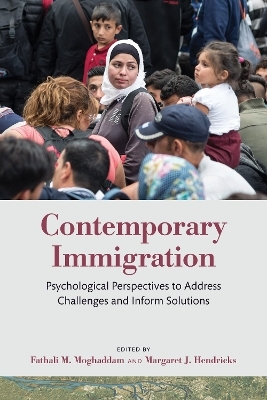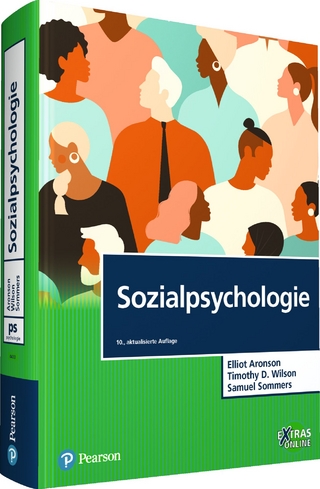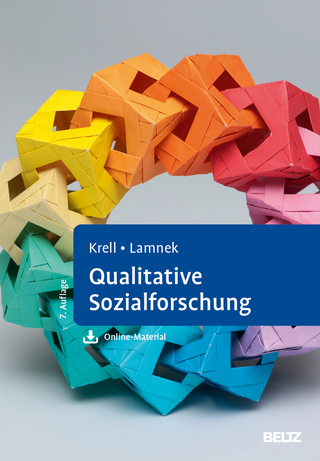
Contemporary Immigration
American Psychological Association (Verlag)
978-1-4338-3627-5 (ISBN)
There were around 281 million international migrants throughout the world in 2020, nearly 4% of the global population. In the decades to come, thanks to ongoing conflict, violence, political instability and the effects of climate change, these numbers will only rise.
This book adopts a broad perspective of psychological science, encompassing both causal and normative behavior, to explore topics related to immigration including gentrification, "crimmigration," and trust between immigrants and host-society authorities.
To some, immigrants represent a threat to the established population's jobs, standard of living, communities, culture, language, and safety. Others view immigrants as offering economic benefits to society including new sources of labor and consumption, and new technical skills and knowledge--not to mention the economic and personal benefits immigrants and their families might gain as well.
While most immigrants leave their home countries for job opportunities, millions of others have been driven away due to conflict, extreme violence, political instability, and climate change.
Authors in this book provide psychological reports of the immigration experience in North America, Europe, Australia, New Zealand, and South America, and address the challenges of integrating immigrants and refugees in host societies.
While critically assessing the immigration crisis globally, this book offers practical solutions to problems of contemporary immigration derived from theoretical constructs such as the contact hypothesis and the common group identity model, while also highlighting key areas of ongoing and future research.
Fathali M. Moghaddam, PhD, is professor of psychology at Georgetown University, where he served as director of the Interdisciplinary Program in Cognitive Science (2016–2021). He also served as editor-in-chief of the APA journal Peace and Conflict: Journal of Peace Psychology (2014–2021). His extensive publications include about 30 books and 300 papers, and he has won a number of prestigious academic awards. Margaret J. Hendricks, PhD, received her PhD in psychology from Georgetown University. She is currently a presidential management fellow in the U.S. federal government. She holds a master’s of public policy degree from Georgetown University and a master's degree in forensic psychology from The George Washington University. Her work has been published in Current Opinion in Psychology, Analyses of Social Issues and Public Policy, and Peace and Conflict: Journal of Peace Psychology.
Contributors
Chapter 1. Contemporary Immigration: Psychological Perspectives on Challenges and Solutions
Fathali M. Moghaddam and Margaret J. Hendricks
I. Immigration in Local Community Context
Chapter 2. Immigration to Smaller Urban and Rural Communities: Challenges and Opportunities
Victoria M. Esses and Bukun F. Adegbembo
Chapter 3. (Not) In My Backyard! Threat Perceptions, Psychological Well-Being, and Collective Action Against Refugee Settlement
Allard R. Feddes, Arnold A. P. van Emmerik, Hannah J. Arjangi-Babetti, Susan Bosdijk, Lisa Klawitter, Alex I. Macdougall, Annelies Heleen Romers, Sofia Tsaousoglou, and Bertjan Doosje
Chapter 4. A Mural Cannot Replace Us: Immigrants, Gentrification, and Displacement
Kipp Pietrantonio, Jasmin D. Llamas, and Keith McIntosh
II. Immigration in a National Context
Chapter 5. Welcoming New Members: Conflicting Reactions to Immigration
Yuen J. Huo and Tom R. Tyler
Chapter 6. Immigrants as Threat and Opportunity: The Australian Experience
Morgana Lizzio-Wilson, Susilo Wibisono, and Winnifred Louis
Chapter 7. Attitude Polarization and Closed-Mindedness: The Immigration Issue in Malta From 2010 to 2020
Gordon Sammut, Luke J. Buhagiar, Rebekah Mifsud, Katya DeGiovanni, and Noellie Brockdorff
Chapter 8. Greek Talk on Migration: Constructions of Modernity Differentials and Cultural Hierarchy
Nikos Bozatzis, Antonis Sapountzis, Liana Lardi, and Maria Xenitidou
Chapter 9. Immigration Through a Cultural Prism: Characteristics and Challenges
Joaquim Pires Valentim
Chapter 10. National Identity and Immigration: Threat From Undocumented Immigrants in the United States
Margaret J. Hendricks
Chapter 11. The Injustices of Crimmigration: Discretion, Detention, and Deportation
Jennifer Woolard
III. Immigration in an International Context
Chapter 12. Immigration to Chile in a Regional Context
Raimundo Salas Schweikart and Margaret J. Hendricks
Chapter 13. Social Trust Among Refugees: Using a Human Rights Lens to Understand Refugee Experiences
Aron Tesfai, Michaela Hynie, Rubaiyat Karim, Gülay Kilicaslan, Cansu Ekmekcioglu, and Palmer Taylor
Chapter 14. From Crimmigration to [Re]integration Following the Removal of "Undesirable" People From Australia to New Zealand
Veronica Hopner, Darrin Hodgetts, Pita King, and Stuart Carr
Chapter 15. The Equality–Difference Paradox: National Policies on Pluralism
Séamus A. Power and Michael Jindra
IV. Looking Ahead
Chapter 16. Toward Solutions for Harmonious Immigrant Integration: A Psychological Perspective
Fathali M. Moghaddam and Margaret J. Hendricks
Index
About the Editors
| Erscheinungsdatum | 18.08.2022 |
|---|---|
| Verlagsort | Washington DC |
| Sprache | englisch |
| Maße | 152 x 229 mm |
| Themenwelt | Geisteswissenschaften ► Psychologie ► Sozialpsychologie |
| Sozialwissenschaften ► Politik / Verwaltung ► Staat / Verwaltung | |
| Sozialwissenschaften ► Soziologie | |
| ISBN-10 | 1-4338-3627-0 / 1433836270 |
| ISBN-13 | 978-1-4338-3627-5 / 9781433836275 |
| Zustand | Neuware |
| Haben Sie eine Frage zum Produkt? |
aus dem Bereich


